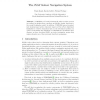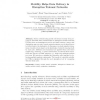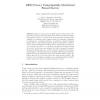134
click to vote
UCS
2007
Springer
15 years 8 months ago
2007
Springer
Ubiquitous computing environments are highly dynamic by nature. Services provided by different devices can appear and disappear as, for example, devices join and leave these envir...
119
click to vote
UCS
2007
Springer
15 years 8 months ago
2007
Springer
In many Ubicomp scenarios tiny wireless embedded sensor devices are used, and devices often collaborate to accomplish a common goal. This paper presents a group formation method de...
148
click to vote
UCS
2007
Springer
15 years 8 months ago
2007
Springer
COMPASS is a location framework where location sources are realized as plugins that contribute probability density functions to the overall localization result. In addition, COMPAS...
115
click to vote
UCS
2007
Springer
15 years 8 months ago
2007
Springer
In this paper, we describe a packet data size minimization method designed specifically for advertising and discovery in ubiquitous networks. The minimization is effective for achi...
116
click to vote
UCS
2007
Springer
15 years 8 months ago
2007
Springer
A ubiquitous environment enable us to enjoy various services “anytime” ”anywhere”. However, “everyone” is not realized. We research an intelligent space “everyone” ...
142
click to vote
UCS
2007
Springer
15 years 8 months ago
2007
Springer
Recognizing activities based on an actor’s interaction with everyday objects is an important research approach within ubiquitous computing. We present a recognition approach whic...
126
click to vote
UCS
2007
Springer
15 years 8 months ago
2007
Springer
Abstract. Sensor networks using mobile robots have recently been proposed to deal with data communication in disruption tolerant networks (DTNs) where an instantaneous end-to-end p...
232
click to vote
UCS
2007
Springer
15 years 8 months ago
2007
Springer
The recommendation system is one of the core technologies for implementing personalization services. Recommendation systems in ubiquitous computing environment should have the capa...
122
click to vote
UCS
2007
Springer
15 years 8 months ago
2007
Springer
Many of today’s proposed RFID privacy schemes rely on the encryption of tag IDs with user-chosen keys. However, password management quickly becomes a bottleneck in such proposals...
138
click to vote
UCS
2007
Springer
15 years 8 months ago
2007
Springer
Abstract. This paper describes daily life activity recognition using wearable acceleration sensors attached to four different parts of the human body. The experimental data set con...



